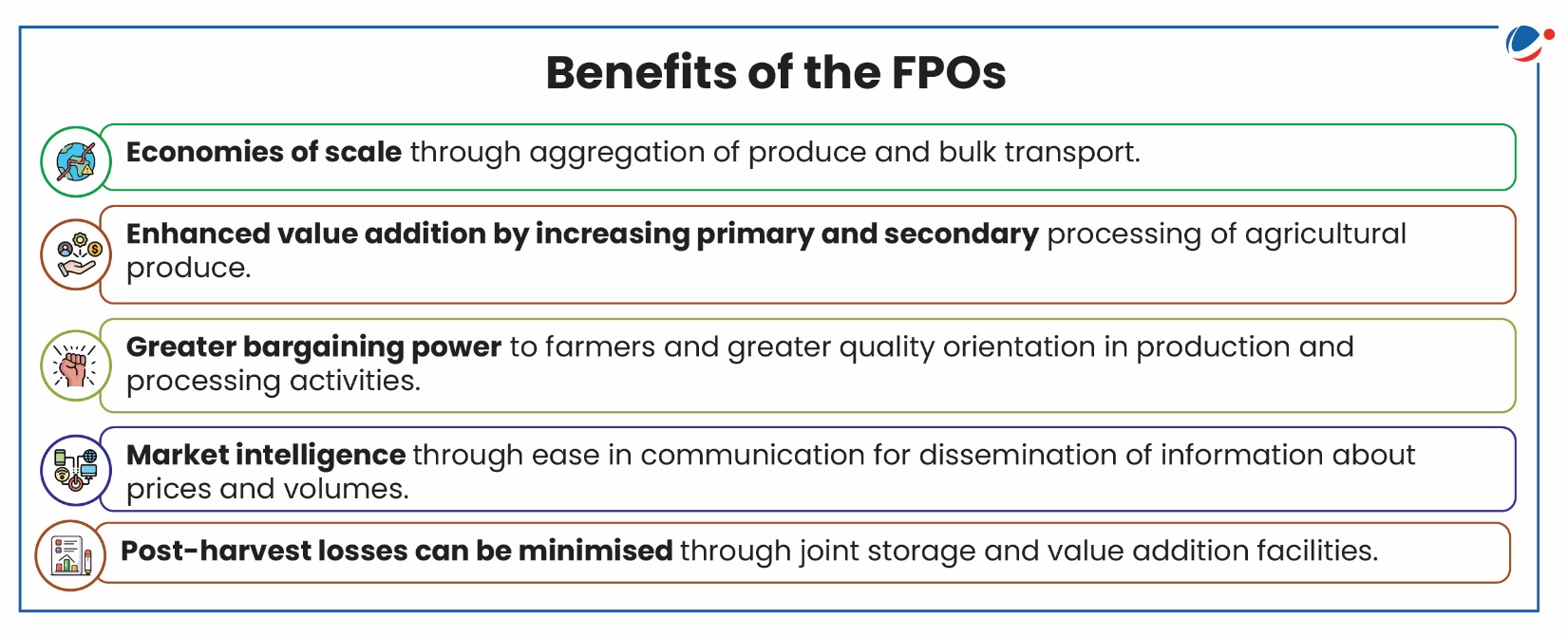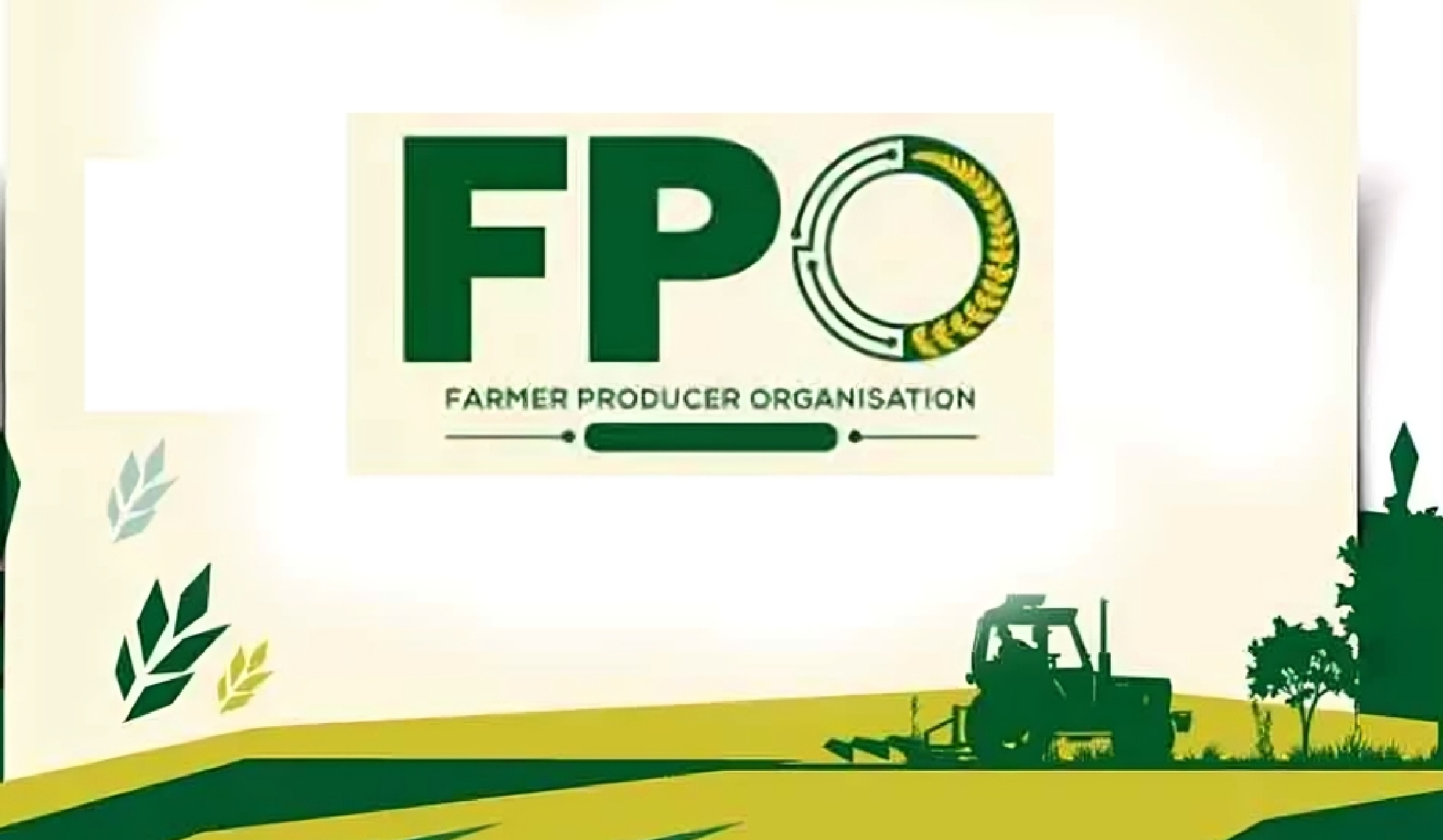Why in the News?
Government has achieved the target of establishing 10,000 Farmer Producer Organisations (FPOs) under Formation and Promotion of 10,000 Farmer Producer Organizations (FPOs) Scheme.
About Formation and Promotion of 10,000 Farmer Producer Organizations (FPOs) Scheme
- Launched in 2020 with a budget outlay of ₹6,865 crore till 2027-28.
- Type: Central Sector Scheme.
- Objective: To provide holistic and broad-based supportive ecosystem to form 10000 new FPOs to facilitate development of vibrant and sustainable income-oriented farming and for overall socio-economic development and wellbeing of agrarian communities.
- Implementing Agencies (IAs): There are total 9 IAs including Small Farmers Agri-Business Consortium (SFAC), National Cooperative Development Corporation (NCDC), NABARD, NAFED, etc.
- IAs will engage Cluster Based Business Organizations (CBBOs) to aggregate, register, and provide professional handholding support to each FPO for a period of 5 years.
- CBBOs are the platform for an end-to-end knowledge for all issues related to FPO promotion.
- IAs will engage Cluster Based Business Organizations (CBBOs) to aggregate, register, and provide professional handholding support to each FPO for a period of 5 years.
- Special focus: Small, marginal and women farmers/ women SHGs as members, SC/ST farmers and other economically weaker categories as members, "One District One Product" approach for development of product specialization and better processing, marketing, branding & export.
- Key Provisions:
- Formation of FPO based on Produce Cluster Area approach and specialized commodity-based approach.
- Financial assistance: Rs.18 lakhs to each FPO towards management cost for 3 years.
- Equity grant: Up to Rs. 2,000 per farmer member of FPO with a limit of Rs. 15.00 lakh per FPO.
- Credits Guaranteefacility: Up to Rs. 2 crore of project loan per FPO from eligible lending.
- Achievement: Since the launch of scheme, ₹254.4 Crore in equity grants has been released to 4,761 FPOs and credit guarantee cover worth ₹453 Cr. has been issued to 1,900 FPOs.
- Approx. 30 lakh farmers in country are connected to FPOs, with around 40% of them being women.
About FPOs
- FPO is formed by a group of farm producers such as farmers, milk producers, etc. with producers as shareholders in the organization.
- Aim: At improving their living standards and to ensure a good status of their available support, income, and profitability.
- FPO is registered either under the Companies Act, 2013 or under the Co-operative Societies Act, 1912 of the concerned States.
- It must be registered with "FPO Registry Portal" maintained by the Central Government and a unique identity number, i.e. RIC (Registration Identity Code) is allotted to the FPO.
- Small Farmers' Agribusiness Consortium (SFAC) was mandated by Department of Agriculture and Cooperation (Ministry of Agriculture) to support the State Governments in the formation of FPOs.

Challenges faced by FPOs
- Lack of Professional Management: Experienced, trained and professionally qualified CEO presently lacking in the rural areas to manage FPO business professionally.
- Post-harvest Losses: FPOs often face limitations in terms of access to modern farming technologies, storage facilities, transportation infrastructure, which can result in post-harvest losses.
- Investment and credit constraint: Limited capability to autonomously invest in primary or secondary processing, storage and custom hiring facilities, and inability of FPOs to access institutional credit without collateral.
- Quality Standards and Certification: Meeting quality standards and obtaining certification for their produce can be a complex and costly process, especially for small and resource-constrained FPOs.
- Climate Change and Environmental Sustainability: FPOs often lack resources and expertise to adopt climate-resilient and sustainable agricultural practices, making them vulnerable to the effects of climate change.
- Market Volatility: FPOs often focus on a single crop or a few crops. This can lead to issues when dealing with crop failures or market fluctuations, which can affect their members' income and profitability.
Way Forward
- Promote the adoption of technology: Such as precision farming, IoT, and farm management software, to enhance productivity and reduce post-harvest losses.
- Capacity building and handholding: Provide training and capacity building programs to FPO members on modern agricultural practices, sustainable farming methods, and effective resource management.
- A standard set of scoring model is required for FPOs in different phase for helping financial institutions, private agencies, CSR agencies and other stakeholders to understand the correct picture of institution before giving resources.






